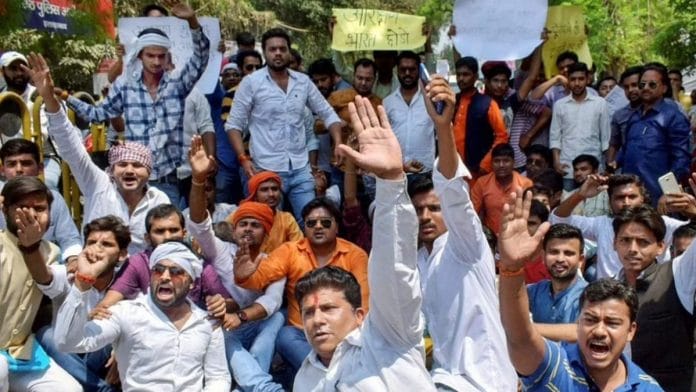Thank you dear subscribers, we are overwhelmed with your response.
Your Turn is a unique section from ThePrint featuring points of view from its subscribers. If you are a subscriber, have a point of view, please send it to us. If not, do subscribe here: https://theprint.in/subscribe/
I have reservations on any type of reservation except for the pre paid ones such as for travel and outstation lodging et al. I fail to understand how distribution of sub-standard education as a concession will benefit a person, family, society, state, Nation and the world. OK, leave the world out of it as the apathy shown for quality post-school education in India has only benefited the outside world as evidenced in the ecstasy and pride in us Indians when someone of “Indian origin” is appointed Governor of a US state, an MP in British parliament or simply as a CEO of a foreign Company! Reservations will NOT deliver salvation. When I say this in public I will immediately be dubbed as a casteist (equivalent to racist elsewhere) and an RSS supporter. For God’s sake , spare me such epithets because they are just that and usually used for purposes other than purported. We must look to uplift the society at large with innovative ideas other than “reservations” , which only helps to win votes and does precious little for the upliftment of the downtrodden. Else majority of Indians will continue to feel safe in “reservations” and never ever attempt at improving the self. It is all in the mind. Let us change the way we think. Reservation in India simply means withholding, some of the seats for the upliftment of status and standard of living of socially and educationally backward sections of society who traditional over centuries were not afforded equal opportunities as some others. But even after 75 years of independence we have failed to achieve the goal of equality among all sections of Indians. This raises the question which everyone avoids to ask. Does reservation serve its intended purpose? People do not ask this question to be politically expedient as the obvious answer will be a resounding “No”. Yet successive Governments have persisted with reservations and increased its ambit by more than double since 1950, with the only intention of garnering votes. Reservation is nothing more than a caste system masquerading as affirmative process. The caste came into being as a division based on occupation. But somewhere along the way it took an ugly turn, spawning the convoluted caste system. Caste based reservations, which now includes backward classes too, have done precious little to dispel the ill effects of the caste system. Despite perpetuating and proliferating reservations for over seven decades, discrimination against sections of society is persisting. One reason is that reservations are being exploited to the hilt by political dispensations and economically well off among those for whom reservations were introduced initially. The system instead of helping upliftment of some sections of the society has only further divided it leading to discrimination and conflicts between different sections. At this point it will be apt to recall a quote attributed to the grandson of Dr. B.R. Ambedkar, Prakash Ambedkar a couple of decades ago. It is true even today. “Legislation doesn’t change people. That’s why B.R. Ambedkar didn’t believe that reservation of constituencies or jobs for Dalits would change the way Indian society looked at its lower castes. He reluctantly agreed to reservation in the belief that it would be discontinued 10 years after the adoption of the Constitution. But half a century later, reservation remains an issue in India.” We are now where we are. What now? We simply have to find a better way for affirmative action and bringing in equality both economically and socially. For starters, let us hope the new education policy and all the efforts for skill enhancements does help in improving education and working skills in all Indians. The key is to improve quality of education simultaneously introducing minimum qualitative requirements (higher level of minimum marks required) to get reserved seats. To use a cliché, teaching people how to fish may yield better results than supplying them with stale fish in the form of reservation, lulling them to stupor. Unless there is an incentive a sense of competition and achievement for success, there will be no improvement in quality ensuring upliftment. Tailpiece: Here is a story to show that how the policies of reservations spawn complacency. This happened in 1987, related by a friend who then worked in an institution of the GOI. In his tenure, once he was responsible to recruit a painter in the Cl IV reserved category. As per existing procedure candidates for the job were sought from the local employment exchange. None from the first two batches were found suitable for the job; all were rejected. It was then the HR department informed my friend that he can’t forever reject candidates for reserved posts. He had to recruit the “best” from the available and teach him the job, in this case to paint, for three months before slotting him into the post.
Also read: SubscriberWrites: India has been a nuclear power since 1954. History was not created only in 2014
These pieces are being published as they have been received – they have not been edited/fact-checked by ThePrint.


